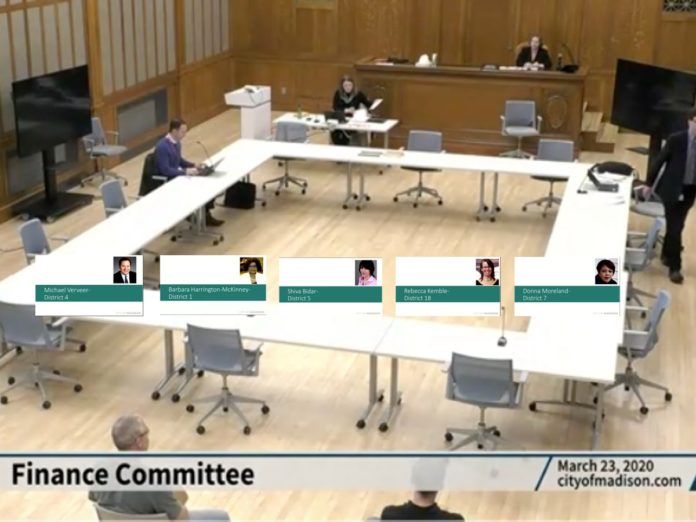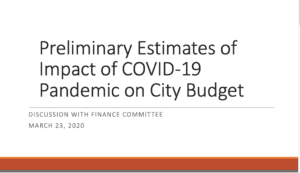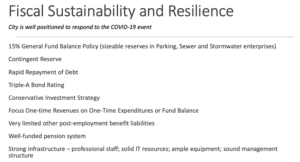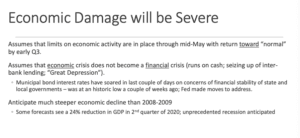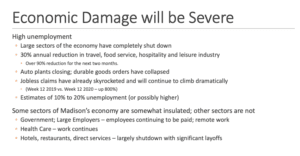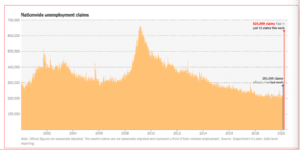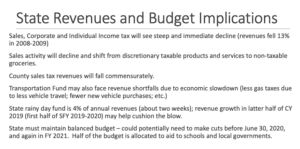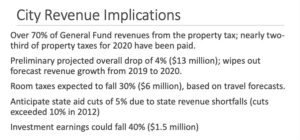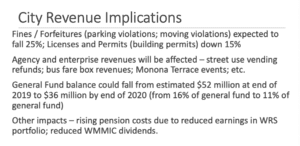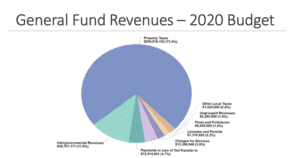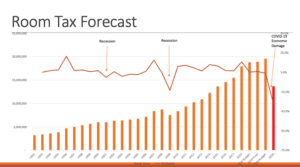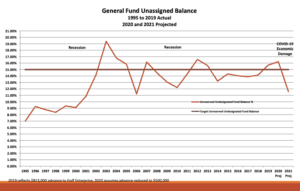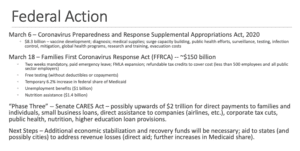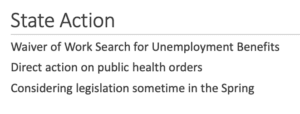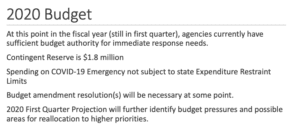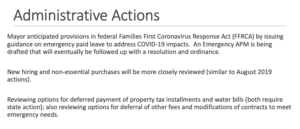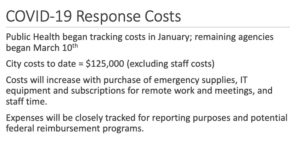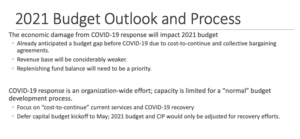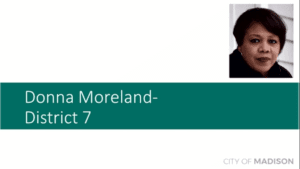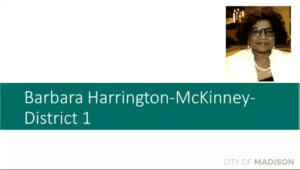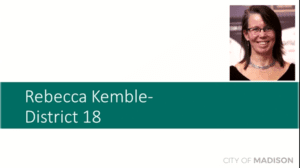City Council’s first remote meeting, mostly focused on the financial update by the finance department and a few other items.
Follow Along here if you are interested
This is the agenda.
INSTRUCTIONS TO ALDERS
Good Afternoon Finance Committee-
The Mayor and Council President Bidar have determined that Monday’s Finance Committee meeting will take place via conference call. Members of the committee, and Alders participating in Monday’s meeting, are strongly encouraged to participate via conference call with the log-in information included below. Members of the public wishing to comment on an agenda item will register and comment in person in MMB 215. Members of the media covering the meeting will also attend the meeting in person.
The full packet is attached here, meeting materials are also available here. Printed copies are available in Alder mailboxes. I will bring any copies left in mailboxes at 3:00pm on Monday to MMB 215. The attachment for item 20 on Monday’s agenda will be distributed via email to All Alders by midday on Monday, hard copies of this document will also be available during Monday’s meeting.
I’ve included the key logistics for Monday’s meeting below. Please take special note regarding the request for exclusions to the consent agenda by Monday at 1:00pm.
Conference Call Information
-
-
- Number: xxx-xxx-xxxx
- Participant Code: xxxxxx#
- All Committee members should begin dialing in at 4:15 to allow time for any necessary troubleshooting.
- There are no central controls for muting and unmuting participants. Each participant is responsible for managing this on their device.
- Do not use the speaker phone function on your phone. If possible, use a headset for the call.
-
Assistance or Technical Issues: Contact the Media Team at 608-266-xxxx for any technical assistance during the call.
Consent Agenda
-
-
- Members of the Finance Committee should submit any file IDs they would like removed from the consent agenda by 1:00pm on Monday afternoon.
- Items requested for separation can be sent directly to Laura Larsen via email (llarsen@cityofmadison.com).
- The Exclusion List will be distributed at 3:00pm on Monday afternoon.
- We are asking for exclusion items in advance to reduce the number of City staff who will need to be physically present at Monday’s meeting.
-
Meeting Role
-
-
- The meeting will begin by taking role of the Finance Committee members.
- Following attendance of the Finance Committee, we will call role of the remaining Alders.
-
Meeting Format
-
-
- The Committee will then vote on the consent agenda.
- Committee Voting: All votes will be taken via role call and recorded accordingly.
- Items excluded from the consent agenda will be taken up in the order they appear on the agenda. The order of business for considering these items will be consistent with in-person meetings (Public Comment, Questions for Staff, Debate, Vote).
- Public Comment: Members of the public who have registered to speak will come to a microphone for their 3 minutes of public comment. The meeting room is set up to allow for appropriate social distancing in the audience space, there are two additional overflow rooms available to accommodate members of the public (MMB 206 and 202).
- Staff Questions: This portion will begin with the Alder requesting separation. City staff with business on Monday’s agenda will be watching the meeting from their workstation. They will be notified to come to MMB 215 in advance of their item being taken up. Each agency will be asked to only send one representative to Monday’s meeting.
- Being Recognized to Speak: The queue for questions and discussion will be managed via email. When you would like to be recognized by the Chair to speak please email financecommittee@cityofmadison.com. Staff managing the email will provide the queue list to the Chair, the Chair will then recognize Committee members or Alders based on the queue.
- The Committee will then vote on the consent agenda.
-
-
-
- When sending an email to be recognized, please list the agenda number as the subject line.
- In the body of the email indicate if you have questions for the registrants, staff, or general debate of the item.
- Both Finance Committee members and Alders can email in requesting to be recognized.
- When you are not recognized to speak place your device on mute. Finance Committee members must ensure they are unmuted at any time when voting is taking place.
-
Thank you for your patience as we have worked through the logistics of setting up this meeting.
Laura
CONSENT AGENDA
Good Afternoon Everyone-
I have attached the consent agenda exclusion list for this afternoon’s Finance Committee meeting. All items not requested for exclusion will be adopted as part of the consent agenda unless there is public comment on the item.
As a reminder, all committee members and Alders are participating in this afternoon’s meeting via conference call. City staff participating in the meeting should attend the in-person location, MMB 215. The room is set up for appropriate social distancing, rooms 202 and 206 are set up as overflow rooms.
Please let me know if you have any questions regarding this afternoon’s meeting.
Thanks,
Laura
Consent agenda
Items requested for EXCLUSION:
20. 60047: Discussion regarding COVID-19 Pandemic Impact on City’s budget.
Items Referred to April 6 th Meeting:
16. 59960 Amending the 2020 Adopted Budget to transfer the Sustainability program (operating and capital components) from the Engineering Division to the Mayor’s Office.
GETTING STARTED
Roll call
Mayor calls the meeting to order
Present: Shiva Bidar, Keith Furman, Rebecca Kemble, Barbara Harrington-McKinney, Donna Moreland, Mike Verveer, Mayor Satya Rhodes-Conway
Other Alders: Patrick Heck, Lindsay Lemmer, Arvina Martin, Tag Evers
Meeting format
Mayor goes over the format, reminding them they are on speaker phone in room 215 where there is the Mayor and a handful of staff, appropriately socially distanced. If you are not speaking please mute yourself. They will start with a consent agenda, all votes will be taken by roll call, then they will take up any items excluded from the consent agenda, they do not have any public comment, but if any comes in they will deal with it on each item. Then they will move to questions of staff and then discussion. If you have questions for staff, or wish to be recognized to speak, please email financecommittee@cityofmadison.com and staff will let her know to call on you. Please in the emails, list the agenda number as the subject line and indicate if you have questions or discussion and a reminder that all alders can email in this way, not just finance committee alders. When you are called on to speak, remember to unmute yourself so we can all hear you.
Consent Agenda
Bidar moves to approve all items on the agenda except 10, 17, 18 and 20. For item 16 is on the consent agenda with recommendation to refer to the April 6th meeting. Harrington-McKinney seconds.
There are no disclosures or recusals.
Vote on the consent agenda – McKinney, Moreland and Verveer had trouble voting – they lost the audio on the phone. They hang up and have people call back in. Someone suggests they chat. Mayor says they cannot vote by text. Mayor says they can hear on the tv but not on the phone. They will work on that on their end, they stand informal until they figure it out. It takes less than a minute. They vote again. This time they lose Furman and Moreland. Mayor calls it because they have 4 ayes which is enough to pass. She announces the consent agenda is passed. Furman votes aye. Mayor asks staff to get Alder Moreland back on the phone.
EXCLUDED ITEMS
Bidar moves approval, McKinney seconds and we are treated to a musical treat – mayor says “Someone put us on hold”. Donna Moreland is back. She announced that they passed the consent agenda and moved on to item 10 which has been moved and seconded.
Verveer thanks the staff for all the extra efforts to facilitate the meeting. He says as a member of the Committee on Sweatfree Purchases he’s familiar with chapter 4 and the requirements and he wants confirmation that Galls is fully compliant and they certified that they are sweat-free compliant for the police and fire uniforms in this resolution.
Dave Schmiedicke says yes, Galls met the minimum threshold standards established by the Sweatfree committee and ordinance.
Verveer confirms they need no waiver – Schmiedicke confirms.
Motion passes – they all vote aye with no issues.
Bidar moves adoption, Harrington-McKinney seconds.
Verveer asks for this item and the next item. Could staff explain the decision that these are for diesel replacement buses, why are alternative fuel buses are not on the table. He says he remembers vividly the Mayor championing hybrid buses in your time as an alder on this committee years ago, so he would welcome her input as well.
Mayor asks Tom Lynch, Transportation Director to describe what this application is for and to answer the question about fuel type.
Lynch says they are asking for 3 articulated buses, equipment such as hoists (?) to do the service for the articulated buses as well as dedicated lane way or bus lane. They would do about a half mile of bus lanes of bus miles on E. Washington Ave and about 3/4 of a mile on Whitney Way. This allows us a (a think we can afford?) and also provides a commitment for the match, however acceptance of the grant would require separate council action. They had contemplated pursuing electric buses right now, however they have not recieved the first three electric buses from (Port- tare?), they were scheduled to be delivered in May, who knows how current events might affect that. The industry is in quite a bit of change with New Flyer proposing some new electric buses. County of Milwaukee is about to release a procurement for buses for the BRT system, we felt at this point it was wisest to just wait to see how the industry, which is rapidly changing and addressing each other unfolds before we decide to procure more buses. We have committed to procuring electric buses but we want to make the right decision. We felt like waiting 6 months before procuring more elect buses would be a wise course of action at this point.
Verveer asks the Mayor if she wanted to add anything given her “vast personal interest and knowledge” on the topic. He presumes she agrees completely with Tom’s explanation, but he is wondering if she had anything to add.
Mayor shares his sentiment and desire to move towards all electric buses as soon as we can, but she bows to the expertise that lives in Metro and their desire to test the buses they have on order before they make a decision about what kind of buses, what manufacturer, the charging systems, etc. As with most things, its more complicated than she would like it to be and at this point in time if we can get moving on the articulated buses, she thinks that is important. With the complete shared understanding that they would be pushing for future procurement to be electric as they move forward.
Motion passes – unanimously with no technical issues!
Bidar moves approval, Harrington-McKinney seconds.
Verveer says his question was asked and answered, there were no other questions.
Motion passes – unanimously with no technical issues!
PRESENTATION ON COVID-19 IMPACTS ON THE CITY BUDGET
20. 60047: Discussion regarding COVID-19 Pandemic Impact on City’s budget.
David Schmiedicke, the Finance Director says he will run through the document emailed to them, it’s also in legistar.
He says they will be looking at some very preliminary impacts, at the macro economic level and how that may make its way through both the state budget as well as the city budget.
The City is in a very good position to respond to the event, both you as a council and the mayor have established a strong fund balance policy plus we have significant reserves in our parking, sewer and stormwater enterprises. As you know we have an $1.8M contingent reserve, we rapidly repay our debt and those combine to give us a triple A bond rating. We use a conservative investment strategy meaning we are not as exposed to changes in the equities market that are happening right now. We focus our one time revenues on one time expenditures or place it in fund balance. They have very small limited post-employment benefit liabilities, well funded pension system and they have a strong personnel infrastructure, equipment and so on, as you have seen in the last few days ramping up to respond.
Much has changed in a very short amount of time, the severity of the economic damage will be great. What he is running through is a preliminary sense of what might happen. It does assume that the limits we are seeing now are in place for the next two months and we will return towards some sort of “normal” operation by early in the 3rd quarter. This does assume that what is now an economic crisis does not become a financial crisis, although you have seen in the last couple days that there have been tremendous strains on the financial system and the federal reserve bank is moving aggressively to release dollars into those markets, specifically as it relates to governments. The municipal bond market basically seized up a couple of days ago, no one was purchasing municipal debt, there is considerable uncertainty about the financial stability of state and local governments. The fed moved quickly to set up facilities to make more dollars available to loosen up those markets and hopefully that will help. He thinks most if not all of the economists are projecting an immediate and steeper economic decline than the great recession of 12 years ago. Some predicting a 24, some now predicting a 30% contraction in the second quarter which is going to lead to an unprecedented recession in recent times. That will translate into high unemployment with large sectors of the economy already completely shut down and more are shutting down with other orders within the state and around the country. Based on some travel forecasts, there will probably be a 30% reduction in those areas, such as travel, hospitality, that are more directly affected by the ability to move. With probably a 90% reduction over the next two months. We see auto plants closing and durable good orders are falling off dramatically. Jobless claims have skyrocketed in the state and nationally and some estimates put unemployment immediately going to 10% and probably reaching 20% or higher over the next several weeks. We are somewhat insulated in Madison because of large employers and government, which means we have employees that continue to be paid and being able to work remotely. We also have a large health care presence that is continuing to work, however our service industry has been largely shut down as you have probably experienced first hand.
This is a picture of what unemployment claims have looked like over the last 20 years, you can see the last two recessions with the middle of the graph being the great recession and the rapid ramp up of unemployment claims. We are already experiencing that peak in the last week or so and that’s just 15 states worth of data, these numbers are going to look a lot worse than 12 years ago.
There is a significant share, not a majority share at all, but a large share of the budget that comes from state aid. So what happens to state aid and state budgets is important to us at the local level. If 2008, 2009 is any guide at all, sales, corporate and individual income tax will probably drop dramatically almost immediately. 13% drop in the great recession, you will probably see that eclipsed. In the absence of dramatic and immediate moves by Congress on fiscal strategies in the midst of this. As you can imagine sales activity is already declining plus where sales is occurring, like in grocery stores, those are non-taxable items. We will see both state and county sales tax fall pretty dramatically. Probably have issues in the state transportation fund, just given less travel as well as less purchase of vehicles, both of which provide significant shares of the revenue shares to the transportation fund. The state rainy day fund is in a much better place than it was 12 years ago, but still not large enough to cushion the dramatic drop that is about to occur. Although the state was witnessing strong revenue growth in the first half of its fiscal year, second half of the last calendar year, and that may help somewhat soften what’s about to happen. As you can imagine, the state has to maintain a balanced budget just as the city does and the drop in revenue could force cuts yet this year, may force cuts next year. And just a reminder that half of the state’s general fund budget is in the form of aid to both school districts and local governments, including cities, counties, towns and villages.
If we can take any positive news out of this, over 70% of the cities general fund is supported by the property tax and nearly 2/3 of property taxes for this year have already been paid, in that sense the city is in a positive position and a strong position in the near term for its cash flow. Right now, very preliminarily projecting an overall drop of 4% in general fund revenues, about $13M. That would take us from the revenue we expected to get in 2020 to the level that we did get in 2019, so it takes out that year of growth. Room tax will be seriously affected and will be expected to fall 30% or $6M and that is based on travel forecasts, which again may be revised considerably depending upon what happens over the next several weeks and months. This forecast does assume that the state does not emerge from this situation unscathed and may need to look at reducing aid to local governments including the city. Just as a reminder in 2012 the city experienced 10% reductions in state aid, which was really the final fallout of the great recession. Investment earnings will fall dramatically given what is happening in the investment areas that the city is engaged in. Some of the areas sensitive to movement and certain types of economic activity like parking violations and moving violations could fall 25%. Expect building permits to fall as much as 15, perhaps 25%. Agency and enterprise revenues, for example street use vending permits, there is some interest in refunding those, the bus fare box revenues, Monona Terrace events, a series of city activities will see less revenues in order to sustain those programs, the general fund may have to step in, again putting more pressure on fund balance, which we project will fall from a little over $50M at the end of 2019 to about $36M. We’ll go from about 16% of the general fund to 11%, so that is the reason we have that fund balance, but it also will be under tremendous pressure over the next few months and we will have to keep in mind how to restore that fund balance out into the future. We could also see out into the future, rising pension costs, the extent to which the Wisconsin retirement system and the investments behind that are affected by what is happening in the stock market and markets generally. We may see WIMMIC, our insurance carrier for liability, we may see lower dividends there resulting in less revenues in our insurance fund and again having to put general fund dollars into that to sustain it.
This reminds you that our general funds, almost 3/4 of it is coming from the property tax, which in this current situation is probably a good thing, its probably one of the most stable revenue sources we could have, but the next largest is intergovernmental revenues which is primarily state aid and the rest of our revenue stream will be affected by what is happening.
This shows the room tax over the last 30 years, and points out the impacts of previous recessions and the room tax is extremely sensitive to economic downturns and this probably the most significant economic downturn we have experienced in decades if not ever. Particularly the drop in the quarter is unprecedented. You can see that that falloff will be dramatic and could be larger than what is shown here.
This gives you a sense of the general fund balance since 1995. Again pointing out where the recessions were and how that affected the city’s fund balance and where we expect it to go under the economic conditions that are presenting themselves as a result of the response to the COVID-19 situation. Our fund balance target is 15% of the general fund budget.
This is a summary of what Congress has been doing as well as the federal reserve. March 6th was the first bill that was adopted, it provided about $8B (billion) in the immediate response, vaccine development, public health efforts and so on. March 18th was the beginning of the pivot towards sustaining the economy, about $150B package including emergency paid leave, expansion of the family medical leave act and refundable tax credits to cover that cost for small business and free testing, an increase in the federal share of medicaid to states to help with the costs of that program expansion and additional money to states for unemployment benefits. The Senate and the House are engaged in phase 3 of the response to the economic situation with a package that was originally looked at a $1T (trillion) now moving closer to $2T, and including a number of elements including direct payments to families and individuals. Trying to shore up small business balance sheets and corporate balance sheets so they can keep people on payroll. Some elements include corporate tax cuts, as well as additional dollars for nuitrition and public health and some deferral of higher education loan repayments. There has been talk of a phase 4 and perhaps further phases beyond that to respond to the economic situation, including perhaps aid to states, but it may be included in the Phase 3 legislation, there has been talk of $150B stabilization fund for states to address some of the issues that he talked about earlier. As well as further increase in medicaid support to states.
The State of Wisconsin has been moving to waive the work search requirements for unemployment benefits and taken the actions you are aware of on public health orders. There has been some talk of legislation in response to the situation which will probably have to occur sometime in the next few weeks.
At this point in the fiscal year, we are fortunate we are still in the first quarter, we are early, agencies do have sufficient budget authority to pay for immediate emergency response needs and the Emergency Operations Center and the Incident Command is ramping up to assist agencies with the purchases that they need to do. He reminds them the contingent reserve which will clearly be tapped for this and with the governor’s emergency order that means that all emergency costs for this situation will not be subject to the state expenditure restraint limits, meaning we can spend on that and not put in jeopardy the $7M in aid we get from that program by keeping our growth in spending below a certain rate. There will have to be budget amendment resolutions at some point over the next few months to both appropriate what is in the contingent reserve to meet emergency costs as well as we imagine appropriating what is in the general fund balance towards these costs. The budget team will be working on first quarter projections soon and that will be the process through which the budget pressures will be more clearly defined and perhaps areas of reallocation identified.
The Mayor really anticipated many of the provisions that are in the family’s first coronavirus response act issuing guidance on emergency paid leave and they very much mirror what is in now federal law regarding additional leave time to individuals who might be affected by COVID-19. An emergency APM and guidance to supervisors is being drafted right now. They will being a process of more closely looking at new hiring and non-essential purchases. Essential purchases now really being focused on the response efforts and those steps and review will be similar to what was done last summer as we came out of the second quarter projections, had some concerns about costs exceeding budget in certain areas and having sufficient monies to finish the year. There are also options being reviewed right for deferring payment for property tax installments. The governor just made another emergency order that waived any late fees for late payment of water bills and the city will be responding accordingly in related bills on the municipal services fees. They are looking at other options for possible deferral of fees and modification of contracts in this emergency situation.
Public Health started tracking COVID-19 costs in January and the budget team stoop up pretty rapidly to get the other agencies tracking those costs. There has been about $123,000 but it does not yet include staff costs which we will see when we get through the pay period. They expect costs to increase with the purchase of emergency supplies and IT equipment. A lot of work done by IT to allow for remote work and there are costs associated with that, along with staff time. Expenses are being closely tracked and Laura has been working already on what the coordination efforts necessary to secure federal reimbursement for those costs.
For developing the budget for 2021, it will be impacted, there was already a budget gap anticipated before this really unprecedented economic situation arose. That was due to just cost-to-continue for services as well as existing collective bargaining agreements, so we will face a revenue base that is going to be considerably weaker than just 2 weeks ago and we will have a fund balance that will be considerably depleted that we will have to begin restoring. From a financial priority as well as requirements around maintaining our triple A bond rating and issues like that. The response to COVID-19 has been an organization wide effort and that means that staff capacity is very limited for running a full budget development process. We anticipate focusing the budget development on cost-to-continue current services as well as COVID-19 recovery from the effects of the response. They will be deferring the capital budget kick off to May, it was supposed to occur in April, and they anticipate that the capital budget and CIP will be focused on recovery efforts and the current program levels.
ALDER QUESTIONS
2020 Budget Cuts
Alder Moreland asks about a renewed budget for 2020, are departments going to be asked to go through and make cuts in their requests for this year, department by department?
Schmiedicke says that as part of the first quarter review, they will be looking at each of the agency budgets, what was added in the 2020 budget, developing lists of areas that are of a lower priority that may need to be reallocated toward the response effort and the impacts of what he described regarding drop off in revenues to the agencies directly as well as what is happening in the general fund and how they might have to respond to that within the non-general fund agencies. Yes, there will be an effort to review the budget and set up the plans necessary for the mayor and council to adjust that budget in response to what we are seeing in our own revenues, both at the agency level and at the general fund level, as well as what might happen externally in terms of action by the state.
Staff pay raises
Moreland says at the beginning of the year all the staff received increases but there was a second tier increase to happen later in the year, will we be freezing that second salary increase?
Schmiedicke says there was only on pay increase that was received in the last pay period of 2019, there is no other pay increase scheduled later this fiscal year. She clarifies that all the pay increases are in effect, Schmiedicke confirms. He says the only unit that does not have a pay plan in place is the teamsters. They are still in the midst of bargaining in an agreement that has already expired.
Freeze on non-essential hires
Moreland asks about the freeze on non-essential position hires. What is determined non-essential. Schmiedicke says its not a freeze at this point. In the summer they had a review process internally to identify those positions within each of the agencies that may be vacant and they may ask to fill, so essential vs non-essential clearly police and fire and other areas of direct service will be a higher priority than support type services that are not directly related to helping with the direct service in this response. It’s a very general sort of review that they did back in August, they will probably continue that.
Mayor says that they have a working definition of essential vs. non-essential with respect to the COVID-19 pandemic that has been identified through each agencies continuity of operations planning and subsequently worked through by our emergency operations center command and they have a work group in the planning section that is specifically focused on this and at this point in time her thinking is that they would be focusing on maintaining staff in essential services from any point of view, so that might mean we re-allocate staff into those essential services, it might mean those hires would be approved to go forward where others would not. She anticipates doing this within the structure of our emergency response. The other thing she would say is that at this time is that most departments would not have the capacity to run a search process, do a hiring or onboard staff. Because we are all very much in the middle of emergency response. That could shift over time as we move from immediate crisis response into holding steady and start to be able to free up time for more of our regular function. At this point in time she doesn’t think anyone has the capacity to think about hiring anybody unless its absolutely critical.
Options to close 2021 budget gaps
Moreland says this question might be premature, but what are the possible remedies to closing any forecasted 2021 budget gaps. I know we just did the wheel tax, hopefully that wouldn’t be something we’d look at again. Schmidieke says that it is too soon to tell on that. We have been presented with conditions that we have never faced before. (Shiva breaks in to ask if everyone is still on the line) He says we’re going to have to adjust accordingly. The fun balance will experience incredible considerable depletion over the next few weeks as we respond and as we see revenues decline. He says there is not a clear answer right now, but it will probably be a review of many options both from a spending and revenue perspective to ensure a balanced budget in 2021.
Hiring freeze
Verveer thanks the finance staff. He asks about administrative action like they did in August last year. The county executive implemented a hiring freeze last week, exempting positions critical to the COVID-19 response. is it fair to say that the explanation you have already given us is in effect a de facto city hiring freeze but we are just not calling it that, or is it overstating the point?
Mayor says that is mostly correct, it’s a matter of semantics. We are not saying that all hiring is frozen, we are saying that each position needs to be reviewed and approved before it can go forward.
Verveer asks if all positions are approved by the Mayor, or the Finance Director or a combinations.
Mayor says it will be screened by finance and would ultimately come to her desk.
Verveer says that Monona Terrace has successfully completed hiring for a position that had not been vacant for over a dozen years for a sales position and they were seeking permission to go ahead with that – extending the offer and hiring the individual even while their facility is shuttered.
Mayor says that specific example has come across her desk.
Verveer asks her to share her thought on that one.
Mayor says it came across before the hiring freeze.
Federal assistance
Verveer asks if there is any further information related to federal action, which is changing by the minute, that there is reason for optimism that local government will receive direct federal funding in the current legislation that is being negotiated and if so, how soon might be see the relief.
Mayor says that it is an incredibly fluid situation in DC, she is getting multiple daily updates from the Washington representatives and from the National League of Cities and the U.S. Conference of Mayors about the progress. They have been actively engaged via Simon and Company and vis Senator Baldwin’s office in trying to advocate for direct relief funding to cities, which she believes is very, very important and she will continue to advocate for that. Obviously the U.S. Conference of Mayors and the National League of Cities are advocating as well for that priority. There is not a deal in the Senate as far as she knows, but it could have changed since she last checked her email, but she does know that folks have been working hard to get not only relief to states but also directly to cities into that package and she doesn’t know much more than that. We continue to advocate on that and encourage everyone else to advocate for that as well. A number of mayor’s around the country have been engaged and working on this and she just hopes Congress will do the right thing. Right know she thinks the majority of the impact and the costs are being borne at the local level.
Free parking ramps
Verveer says his final question is to thank the Mayor for the implementation of free fares on Metro Transit effective in the morning, but it will add to our revenue loss. Schmiedicke covered several of the areas alders are fielding from our constituents about financial relief from city hall, but one area that is the free parking meters, so he thanks the mayor for in essence declaring a meter holiday for the foreseeable future. The one area he continues to get requests from Downtown Businesses, not withstanding the governor’s stay-at-home order and closing non-essential businesses which we will get more specifics of in the next many hours, but has there been much consideration, if any, to open the parking garages as well for free.
Mayor says they have discussed that and the parking utility at this time has recommended not moving forward but it is certainly something that they will continue to revisit as they get deeper into this thing. She is really aware of the incredibly negative impact that this is having on our small business community, across the board, but especially in the retail and hospitality sectors and they are trying to do as much as they possibly can to support our small business community, but their powers are limited. They can look again at the parking ramp question if we see that the free on street parking is not sufficient. She says that she personally talked with Governor Evers last week and did prioritize asking him to do whatever he could to provide direct relief to our small and local businesses. He is very sympathetic and she is hopeful that he and the legislature will take action.
Verveer says that perhaps the issue of free parking garage availability is going to be rendered moot and many of the businesses that are struggling to stay open, and they will be told to shutter in any event, but it is something that the businesses that are trying to remain open have been asking for, so I appreciate our continued consideration of that request. He thanks her again for the carry out delivery zones and not having to feed the meters, etc.
How to get questions answered
Mayor says that if alders are hearing specific requests from the community, from any segment of the community with respect to what the city could do in response to this pandemic, she strongly encourages them to funnel those through your chief of staff so he can funnel those up to the EOC for their consideration. Just so you know, the way that this is working is that as those requests come in from the council chief of staff, they are assigned to the appropriate section of the EOC and then if needed a policy is developed for her approval and then they forward it out for implementation. They do look at everything that comes in, and it does get processed through the EOC. She encourages them to be in good communication with Kwasi so he can forward things on to the EOC.
Vehicle registration fee
She asks about the auto renewal costs, but since the city is looking at various areas for financial relief, is it on the table for possible consideration of relief in that area?
Mayor says the vehicle registration fee is administered by the state, and so it is not clear to her, but she thinks that would need to be action taken at the state level for relief there.
Harrington-McKinney clarifies that it would start at the state level and then filter down to the city?
Mayor says that because the vehicle registration fee is administered by the state, any move to delay due dates or waive fees would have to come from the state and they would implement it, because we are not involved in managing that program at all.
Harrington-McKinney says that isn’t something on the table, is that correct?
Mayor says she has not heard anything about that from the state but that doens’t mean they are not thinking about it.
Future finance updates
Harrington-McKinney says she hears this is a two month forecasting and I’m sure they are already looking beyond the two months, when do you anticipate an update to come again. I think you said it but I didn’t jot it down.
Laura Larsen says roughly April.
Schmiedicke says that they would expect to have more information in terms of 1st quarter projection, at an agency by agency level but late April and probably could return at some point then. They will continue to watch this very closely over the next few weeks. Some of these revenue streams we won’t know for sure are happening for several weeks and maybe months in terms of the impact. And they will have to wait and see what might happen at the State level in terms of the state budget.
General Fund un-assigned balance slide – Golf Enterprise
At the bottom of this slide it listed the 2019, $813,000 advanced to golf enterprise, could you say more about those, how is that impacting what we are looking at.
Schmiedicke can’t hear her, there is static, she repeats.
He says with golf we will probably see that at the end of 2019 their shortfall has expanded to about $1.3M and that is currently being absorbed in the general fund balance in effect and clearly we are on a different track with the emergency right now, but as you recall there is a task force looking at the next steps with the golf enterprise and whatever is decided there or recommended or proposed there and decided by the mayor and the council will have to take into account what is happening with revenues vs. expenditures in the golf enterprise, how that impacts the general fund, it is already impacting the general fund and how we move forward with a permanent solution to that financial situation.
Harrington-McKinney says that is a concern.
Contingent Reserve
Harrington-McKinney asks about the $1.8M contingent reserve, will we be notified when it gets to a danger zone. At one of the past finance committee meetings it got very low and the finance committee was made aware of that. In your updates you will be letting us know if we approach that critical touch point?
Schmiedicke says they will continue to keep the finance committee apprised of the city’s financial condition and they will have to return to the council to amend the budget, including appropriating the contingent reserve and the general fund balance to address emergency costs that exceed current budgeted levels.
Re-directed employees accommodations
Will employees redirected from their usual work into essential front-line services be able to get accommodations if they don’t feel safe working in those positions.
Mayor says yes, in as much as we are accommodating all of our staff and trying to keep everyone working in essential services safe, socially distance and with all of the cleaning materials that they need. The reallocation process first priority is to reallocate within departments and divisions if at all possible so people are doing similar work. But we are already and may continue to need to reallocate folks across departments and divisions and that will be done while keeping in mind both people who have higher risk factors or may need accommodations already on a regular basis and then with respect to this virus.
Kemble asks about someone who is living with or taking care of an elderly or immuno-compromised person at home, would that be considered a risk factor for them.
Mayor says she thinks it would. That is the kind of situation that she would encourage any employees to take directly to their supervisors and hope that we could settle that within a department or division perhaps with the assistance of HR. That is the kind of thing that supervisors are already taking into account.
Kemble asks if there will be an HR policy delineating those so that it is not just up to the discretion of a supervisor, but so everyone knows what these risk factors are and what they can expect.
Mayor says HR is working on a FAQ and guidance on the leave policy now.
Timelines on Federal Emergency Funding
Bidar asks what the timeline would be, would we expect funds to come into our budget next year, or have we seen things happen faster than that?
Schmiedicke says they would expect that these reimbursements from the federal government, where we spend the dollars first, given the scope nationally and depth of the situation in other parts of the country, he would foresee we would not be reimbursed even in 2021, it may be later than that.
Larsen says that we do have a lot of great lessons learned from working with FEMA on the 2008 [sic] flooding, so we are able to set up all of our reporting needs and know exactly what we would need for reimbursement based off the guidance we have today so we are minimizing the amount of time that we have to do administrative work to compile all of the information that will be needed for cost reimbursement. She thinks that they are being proactive as they can possibly being, knowing that the scope of this is so enormous.
Bidar says the timeline is important because your general reaction when you hear about emergency funding is that it is coming immediately. Like its wire transferred into our account, so continuing to talk about the time line as you learn more would be really good for us to know.
Mayor says there may be multiple categories of funding, certainly the emergency reimbursement will very closely track what Dave and Laura just said, if Congress should see fit to include direct aid to cities in one of their packages, she thinks the current conversation is that it would be structured similar to the CDBG program and allocated accordingly, so that would probably come in on yet another timeframe. They would have to work that through the federal system and there may be other categories. The last time she checked the proposal the Senate Republicans were forwarding did have transit aids in it. She thinks there may be a bunch of potential categories of funding from the federal government that they may be able to tap into, but they will probably all come on different timeframes and none of them will be quickly.
Wrap Up by Mayor
The Mayor says she has been incredibly impressed and grateful to staff for making this possible for us to meet remotely, to meet open meetings laws and still allow for public comment even tho we didn’t have any. It has taken a considerable number of hours across dozens of staff to make this possible and she thanks them.
She also thanks the Finance Committee and the other members of the council that are joining us on the phone for putting up with technical issues and for agreeing to participate remotely. This is clearly going to be very complicated for us to continue our democratic process with appropriate social distancing and moving on-line as much as we can, but staff, particularly IT staff are working very hard to make this possible. So she thanks them.
Motion to Adjourn.
Moreland moves approval, Bidar (and others) second. They all vote to adjourn with no technical problems.

